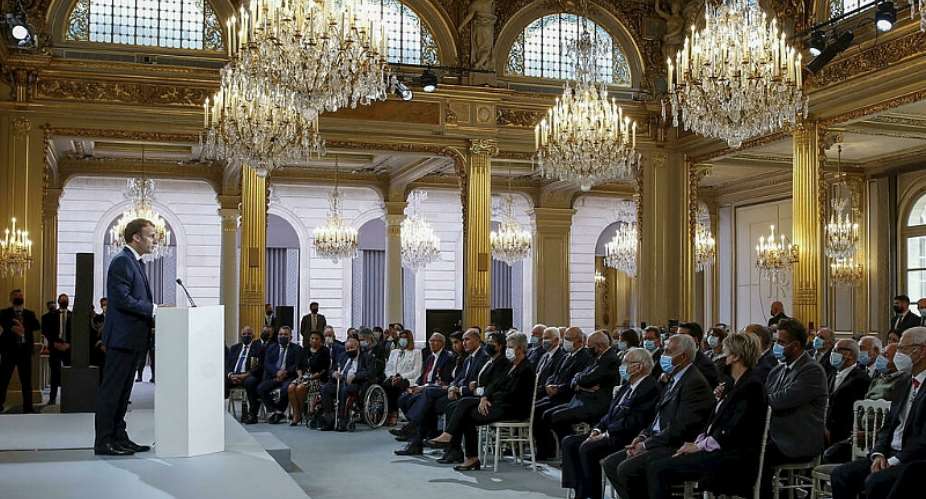French president Emmanuel Macron has announced that he would create a law for the recognition and reparation for Harki soldiers and their families.
The Harkis were the Algerian muslims who fought on the side of the French during the war of independence, but afterwards were left to fend for themselves.
"The history of the Harkis is grand, and it is painful..." Macron said at the Elysee palace, during an address given in the presence of some 300 people, including descendants of Harki soldiers and representatives of support organisations.
"France did not pay its dues to Harkis, their wives, their children after the war," he said, adding "the Harkis gave their strength, spilled their blood for France."
The government will "by the end of the year inscribe the recognition and reparation with regards to harkis into law. Their honour must be engraved into our national memory," he went on.
Macron pointed out that all of his predecessors had spoken on this subject since 2001 and he wanted to take a "new step".
Most recently, in 2016, former leader François Hollande said: "I recognise the responsibility of French governments in abandoning the Harkis, the massacres of those who remained in Algeria and the inhuman conditions for those transferred to camps in France".
Macron's speech at one point was interrupted by a woman in the audience.
He addressed her personally: "There are no words which could repair what you have been through," he said.
He called for healing, which would come through words of truth, memory and justice.
"I want to acknowledge all of you who fought; we will not forget.
"We are indebted to you, and we ask for forgiveness," Macron concluded.
Crimes against humanity
Up to 200,000 Harkis -- the name comes from the Arabic word for "movement" -- fought for the French colonial power during the bloody war from 1954 to 1962 with Algeria's National Liberation Front (FLN).
After a peace accord granting Algerian independence was signed on March 18, 1962, only 42,000 Harkis were allowed to go to France, some bringing their wives and children.
The French government initially refused to recognise their right to stay in France.
In all up to 90,000 men, women and children fled. The rest remained in Algeria, where many were massacred.
Harki activists in France who tried to prosecute Algeria in 2001 for crimes against humanity, claimed 150,000 were killed.
Those lucky enough to get to France were held for years in squalid internment camps.
Despised as traitors in Algeria, in France the Harkis were an inconvenient reminder of the country's painful defeat.
The seven-year war of independence in Algeria saw nationalists rise up against and eventually defeat their French colonial rulers. There were atrocities on both sides and the conflict left at least 400,000 dead.
Rejected by their homeland
Around half a million Harkis and their descendants live in France today.
They have fought a decades-long struggle, including hunger strikes and demonstrations, for official recognition of what happened to those left behind in Algeria.
Their integration into France has been difficult as they are considered immigrants, but are rejected by other immigrants.
In 2000 then Algerian president Abdelaziz Bouteflika compared them with Nazi collaborators during a visit to Paris.
While criticising the conditions under which they were housed in France, he ruled out their return to Algeria.
In 2001 France held its first ever national day to honour to the Harkis, a day which is marked each year on the 25th of September.
In 2018, a 40-million-euro aid package was created for them and their families.
The same year the country's highest court ordered the state to pay compensation to the son of a Harki for damage to his health in the camps.





 EC pays over GH¢69 million to 116,211 temporary staff for 2023 District Level El...
EC pays over GH¢69 million to 116,211 temporary staff for 2023 District Level El...
 Police directive to stop searches on foreign trucks raises security concerns — D...
Police directive to stop searches on foreign trucks raises security concerns — D...
 Stop checking Trucks bearing foreign plates — Police management to regional comm...
Stop checking Trucks bearing foreign plates — Police management to regional comm...
 ‘Stop extorting, harassing local truck drivers too’ — Ablakwa jabs Ghana Police ...
‘Stop extorting, harassing local truck drivers too’ — Ablakwa jabs Ghana Police ...
 ‘Of course, your misgovernance legacy deserves to be destroyed’ — Mahama replies...
‘Of course, your misgovernance legacy deserves to be destroyed’ — Mahama replies...
 I won’t protect your ‘legacy’ of corruption, arrogance – Mahama replies Akufo-Ad...
I won’t protect your ‘legacy’ of corruption, arrogance – Mahama replies Akufo-Ad...
 Depreciating cedi: We better adopt a currency board or official dollarisation – ...
Depreciating cedi: We better adopt a currency board or official dollarisation – ...
 Limited Voter Registration: Three people arrested for causing disruptions during...
Limited Voter Registration: Three people arrested for causing disruptions during...
 Inflation in April dropped to 25.0% – GSS
Inflation in April dropped to 25.0% – GSS
 The rumours did not emanate from us — Société Générale on purported exit from Gh...
The rumours did not emanate from us — Société Générale on purported exit from Gh...
